Reviews for February 5th, 2010
Dear John
Directed by Lasse Hallström.
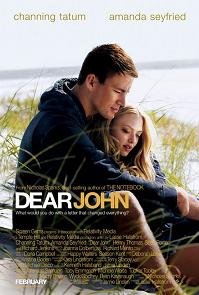
Based on the novel by Nicholas Sparks. John Tyree (Channing Tatum), a U.S. soldier, meets Savannah Curtis (Amanda Seyfried) , a college student, while home on leave during spring break 2001. The two instantly fall in love and, soon enough, John introduces her to his father (Richard Jenkins), an obsessive coin collector who’s suffering from Asperger’s Syndrome, a mild form of autism. When the 9/11 tragedy takes place, John must go back to fight overseas and feels sad to be separated from the love of his life. He and Savannah promise one another that they’ll communicate with one another through writing letters in order to keep their romance alive. When John goes off to war, Savannah bonds with his autistic father and, after corresponding back and forth with John through many letters, she suddenly writes her very last letter simply stating that she has moved on with her life. Has she gone off to marry her best friend, Tim Wheddon (Henry Thomas), perhaps? Will John return from the war and confront Savannah in hopes of getting some sort of closure? Anyone who’s ever watched a romantic drama before will be able to figure out everything that happens from the very first moments that you meet John, Savannah and, briefly, Tim. The lazy, dumbed-down screenplay by Jamie Linden fails to bring any of these characters to life; the only mildly interesting one is John’s father, played by the underrated, reliable-as-always Richard Jenkins. Even the musical score and beautiful scenery, while quite lively, just adds to the sappiness and will make you roll your eyes rather than moved to tears or uplifted. Both Channing Tatum and Amanda Seyfried are attractive stars, but Tatum gives a wooden performance while Seyfried overacts at times. They both lack charisma onscreen and it’s not quite clear what Savannah sees in John in the first place beyond his good looks. Moreover, why should she trust him given his troublesome past? The third act piles on so many contrived, schmaltzy, including a character’s sudden battle with cancer, that it feels overstuffed and like a Lifetime TV movie-of-the-week. At a running time of 1 hour and 45 minutes, Dear John is bland, excessively corny, schmaltzy and contrived while lacking any requisite romantic chemistry. It cannot be saved by picturesque scenery and attractive leads alone. Number of times I checked my watch: 4 Released by Screen Gems. Opens nationwide. 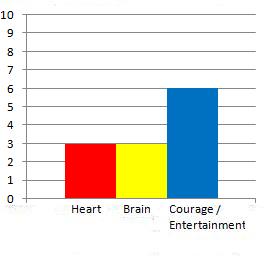
Eyes Wide Open
Directed by Haim Tabakman.
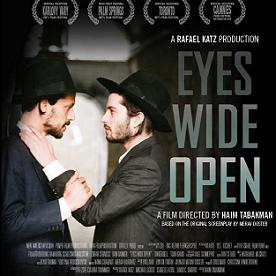
In Hebrew and Yiddish with subtitles. Aaron (Zohar Strauss) lives with his wife, Rivka (Tinkerbell), and four children in an ultra-Orthodox community of Jerusalem. He runs a butcher shop that had once belonged to his father when he was alive. One day during a downpour, a younger Orthodox man, Ezri (Ran Danker), arrives at his shop to seek shelter from the rain and asks for a place to stay as well. Aaron graciously offers him a job as his apprentice at the butcher shop and lets him sleep at the back of the shop. Soon enough, Ezri ignites a long-buried homosexual passion within Aaron, and the two of them find it difficult to resist that temptation, which, in the Orthodox religion, is a major sin. Can Aaron and Ezri keep their taboo love affair with one another a secret from their community as well as Aaron’s wife and kids? If the secret ends up uncovered for all to see, how might that affect their relationship, Aaron’s family life and reputation within his community? The sensitive screenplay by Merav Doster explores those questions and issues with genuine tenderness and insight that never feels contrived, preachy or melodramatic. Doster does a terrific job of bringing each character to life so that they’re not one-dimensional caricatures. Instead they’re complex, intelligent human beings---after all, Aaron and Ezri are trying to stay true to their nature by not bottling in their homoerotic feelings. The Orthodox men in the community who look down upon them and threaten to never purchase anything at Aaron’s butcher shop anymore are merely conforming blindly to the customs of their religion without opening their mind or their heart for that matter. First-time director Haim Tabakman moves the film along at an appropriately leisurely pace and includes impressive cinematography that adds to the film’s richness. Does Rivka know or suspect about what’s going on between her husband and Ezri? There’s a lot that goes unspoken between her and Aaron which, in a less true-to-life film, would lead to a loud, lengthy confrontation between husband-and-wife, but the way that it’s handled here is poignantly realistic. It’s also worth mentioning the well-chosen title which could be taken both literally and, more interestingly, on a figurative level. At a running time of 1 hour and 30 minutes, Eyes Wide Open manages to be brave, provocative and gently engrossing with well-nuanced performances. Number of times I checked my watch: 1Released by New American Vision. Opens at the Cinema Village. 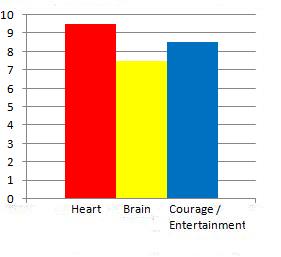
Red Riding Trilogy
Directed by Julian Jarold, James Marsh and Anand Tucker.
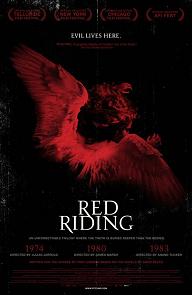
Based on true events and on the novels by David Peace. This trilogy of crime thrillers begins with 1974, directed by Julian Jarold, about Eddie Dunford (Andrew Garfield), a young reporter for the Yorkshire Post who investigates the disappearance of a little girl. When the girl shows up dead, Eddie digs deeper into the murder mystery and gets himself into more and more trouble with tough policeman, Bob (Sean Harris) and Tommy (Tony Mooney), who use aggressive tactics to stop him from making any progress in the investigation. Not only does he put his job on the line with his editor, Bill (John Henshaw), but also risks his own life, especially when he starts to have feelings for and spend time with Paula (Rebecca Hall), a lonely, widowed mother of another missing girl. The 2nd part of the trilogy, entitled 1980, directed by James Marsh, follows a married police officer, Peter Hunter (Paddy Considine), as he returns to Leeds to try to solve the serial killer case with the help of two investigators, Nolan (Tony Pitts) and Helen Marshall (Maxine Peake), whom he’s once had an affair with. He has a hunch that Michael Myshkin (Daniel Mays), a retarded man, didn’t commit any of the crimes that he had confessed to and that someone had forced him to confess for some reason. David Morrissey plays Maurice, the new, intimidating police chief while Peter Mullan shows up as a very shady minister, Martin Laws. In the culminating part of the trilogy, 1983, directed by Anand Tucker, police corruptions runs deeper as the police chief, Maurice, suffers a crisis of conscience that puts his life and career in danger while a lawyer, John Piggott (Mark Addy), defends the retarded man who’s wrongly convicted of the serial killings as the real criminals have yet to be found. Each of the three full-length feature films in the trilogy has a different visual style and tone that sets them apart. The intricate plot filled with police corruption and cover-ups becomes less and less confusing throughout the trilogy as more revelations come about. Admittedly, though, the most gripping and intriguing film is the first one, 1974, while the following two films are slightly less so, but nonetheless still compelling as you try to connect all the dots and figure out how all of it will end. The Red Riding Trilogy ultimately manages to be a stylish, suspenseful, gritty and intriguing crime saga. Number of times I checked my watch: 1 Released by IFC Films. Opens at the IFC Center. 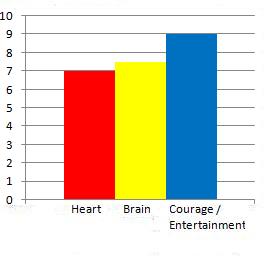
Terribly Happy
Directed by Henrik Ruben Genz.
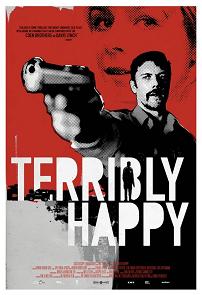
In Danish with subtitles. Based on the novel by Erling Jepsen. Robert (Jakob Cedergren), a police officer, transfers to Skarrild, a small town in Denmark, after suffering from a nervous breakdown and committing some sort of misdeed back in Copenhagen. He calls his wife every now and then and leaves messages on her machine, but she repeatedly doesn’t pick up the phone or call him back. When a young boy gets caught shoplifting for the second time, Robert learns that the law enforcement in Skarrild prefers to use violence and aggressive over standard protocol, so he’s told to hit the boy instead of to arrest him. He meets Ingelise (Lene Maria Christensen), a woman who’s abused by her domineering, alcoholic husband, Jorgen (Kim Bodnia). Ingelise seeks comfort from Robert and, soon, they have a secret, sexually-charged love affair. Director/co-writer Henrik Ruben Genz combines gritty action, psychological thrills, suspense, drama and dark humor in a very smooth, compelling and refreshingly intriguing way that’s very Coen-esque and even Lynchian in its different tones. Just when you think the plot will veer in a particular direction, it suddenly shifts gears and surprises you with its twists. To explain the events that occur as a result of the love affair between Robert and Ingelise would spoil the surprises. If the screenplay weren’t so organic, filled with intricate details and well-developed characters, the twists would seem gimmicky and contrived rather than clever and realistic within the context of the narrative itself. In the most crime thrillers nowadays, i.e. Edge of Darkness, the first act follows with a mediocre second act and then onto a convoluted, messy third act. Here, though, the transition from one act to the other seems smooth and consistently well-written without insulting your intelligence or creating nausea through confusion and convoluted subplots. Moreover, Jakob Cedergen gives a solid performance that masters Robert’s toughness as a police officer as well as his fragility as a human being with a moral conscience. At a running time of 1 hour and 30 minutes, Terribly Happy manages to be a taut, intriguing and refreshingly well-crafted crime thriller brimming with many clever twists and turns. Number of times I checked my watch: 0 Released by Oscilloscope Laboratories. Opens at the Angelika Film Center. 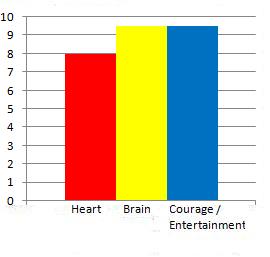
Main Page
Alphabetical Menu
Chronological Menu
______________________________________________________
|








